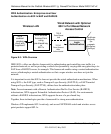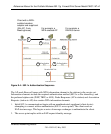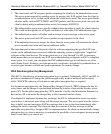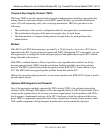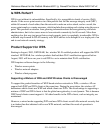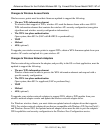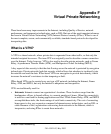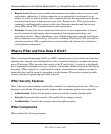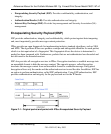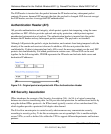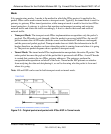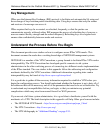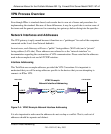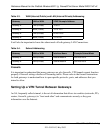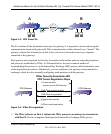
Reference Manual for the ProSafe Wireless 802.11g Firewall/Print Server Model FWG114P v2
F-2 Virtual Private Networking
201-10301-02, May 2005
• Remote Access: Remote access enables telecommuters and mobile workers to access e-mail
and business applications. A dial-up connection to an organization’s modem pool is one
method of access for remote workers, but is expensive because the organization must pay the
associated long distance telephone and service costs. Remote access VPNs greatly reduce
expenses by enabling mobile workers to dial a local Internet connection and then set up a
secure IPSec-based VPN communications to their organization.
• Extranets: Extranets are secure connections between two or more organizations. Common
uses for extranets include supply-chain management, development partnerships, and
subscription services. These undertakings can be difficult using legacy network technologies
due to connection costs, time delays, and access availability. IPSec-based VPNs are ideal for
extranet connections. IPSec-capable devices can be quickly and inexpensively installed on
existing Internet connections.
What is IPSec and How Does It Work?
IPSec is an Internet Engineering Task Force (IETF) standard suite of protocols that provides data
authentication, integrity, and confidentiality as data is transferred between communication points
across IP networks. IPSec provides data security at the IP packet level. A packet is a data bundle
that is organized for transmission across a network, and includes a header and payload (the data in
the packet). IPSec emerged as a viable network security standard because enterprises wanted to
ensure that data could be securely transmitted over the Internet. IPSec protects against possible
security exposures by protecting data while in transit.
IPSec Security Features
IPSec is the most secure method commercially available for connecting network sites. IPSec was
designed to provide the following security features when transferring packets across networks:
• Authentication: Verifies that the packet received is actually from the claimed sender.
• Integrity: Ensures that the contents of the packet did not change in transit.
• Confidentiality: Conceals the message content through encryption.
IPSec Components
IPSec contains the following elements:



